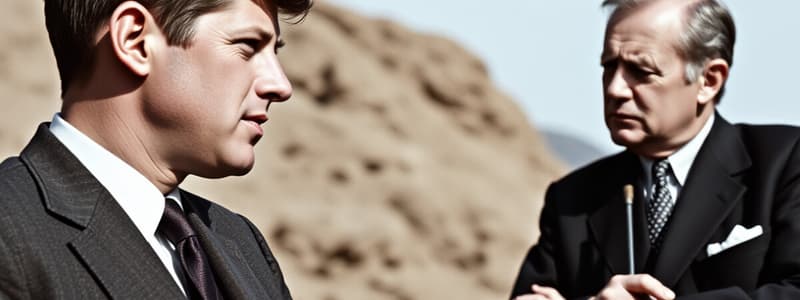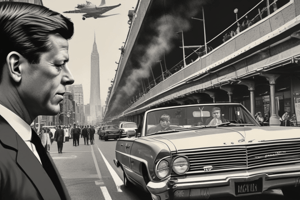Podcast
Questions and Answers
What did JFK promise during his campaign against Nixon?
What did JFK promise during his campaign against Nixon?
- Expand military operations
- Reduce government spending
- Use federal programs to strengthen the economy (correct)
- Increase taxes on the wealthy
What was the 'New Frontier' referred to by Kennedy?
What was the 'New Frontier' referred to by Kennedy?
An ambitious agenda for his presidency.
Who did Castro oust to change Cuban history?
Who did Castro oust to change Cuban history?
Fulgenico Batista
What significant action did the United States take on October 19, 1960, regarding Cuba?
What significant action did the United States take on October 19, 1960, regarding Cuba?
What event is associated with the Bay of Pigs?
What event is associated with the Bay of Pigs?
What was a key outcome of the Cuban Missile Crisis?
What was a key outcome of the Cuban Missile Crisis?
What did the Cuban Adjustment Act signed by Johnson allow?
What did the Cuban Adjustment Act signed by Johnson allow?
What significant civil rights action occurred in 1960 at a Greensboro lunch counter?
What significant civil rights action occurred in 1960 at a Greensboro lunch counter?
What landmark legislation did the Civil Rights Act of 1964 address?
What landmark legislation did the Civil Rights Act of 1964 address?
What was the primary goal of the Freedom Summer campaign?
What was the primary goal of the Freedom Summer campaign?
What was the result of the Voting Rights Act of 1965?
What was the result of the Voting Rights Act of 1965?
What was the Great Society?
What was the Great Society?
Who was Betty Friedan?
Who was Betty Friedan?
What was Rachel Carson's book 'Silent Spring' about?
What was Rachel Carson's book 'Silent Spring' about?
What created a significant gain for American environmentalism in the 1960s?
What created a significant gain for American environmentalism in the 1960s?
What did the National Organization for Women (NOW) advocate for?
What did the National Organization for Women (NOW) advocate for?
Flashcards are hidden until you start studying
Study Notes
JFK v. Nixon
- Kennedy advocated for federal programs to enhance the economy and tackle poverty, contrasting Nixon's call for reduced government spending and reliance on private enterprise.
- Both candidates experienced significant criticism during the election.
New Frontier
- Kennedy's administration began in 1961, lacking an electoral mandate, presenting challenges to his ambitious New Frontier agenda.
Castro vs. Batista
- Fidel Castro's revolutionary forces overthrew corrupt President Fulgenico Batista on January 8, 1959, marking a shift in Cuban leadership.
U.S. vs. Castro
- Initially, the U.S. recognized Castro's government after pulling support from Batista but remained cautious of Castro's socialist inclinations.
Embargo
- On October 19, 1960, the U.S. imposed a near-total trade embargo to economically isolate Cuba.
Bay of Pigs
- On April 16, 1961, a poorly planned invasion by Cuban exiles at the Bay of Pigs failed, solidifying Castro's authority and embarrassing the Kennedy administration.
Cuban Missile Crisis
- One of the most significant foreign policy crises, resulting in the Soviet Union withdrawing missiles from Cuba in exchange for the U.S. removing missiles from Turkey and a no-invasion pledge.
Cuban Refugees
- Post-Cuban Missile Crisis, emigration resumed in the mid-1960s, leading to the Cuban Adjustment Act of 1966, allowing many refugees to gain permanent residency in the U.S.
Civil Rights Movement
- The early 1960s saw a surge in protests, marches, and other actions aimed at combating segregation and discrimination.
Sit-ins
- The modern civil rights movement was characterized by sit-ins, which began with four African American students at a Greensboro lunch counter in 1960, challenging segregation directly.
Freedom Riders
- Activists organized bus rides across states to fight segregation in public transportation following a Supreme Court ruling against it.
Albany Movement
- A coalition of civil rights groups, including SNCC and SCLC, worked to challenge racial segregation in Albany, Georgia.
James Meredith
- In October 1962, Meredith became the first Black student at the University of Mississippi, leading to riots and federal intervention.
Birmingham Campaign
- Organized by the SCLC in April and May 1963, aimed at ending segregation in Alabama's largest city through direct action.
Martin Luther King Jr.'s Letter
- MLK's imprisonment in Birmingham inspired his famous letter advocating for nonviolence and active confrontation of injustice.
George Wallace
- Alabama Governor Wallace became an emblem of racial conservatism, famously declaring "Segregation now, segregation tomorrow, segregation forever."
Medgar Evers
- Civil rights leader Medgar Evers was assassinated after Kennedy's call for civil rights legislation, highlighting ongoing violence against civil rights advocates.
March on Washington
- The August 1963 march championed civil rights legislation, culminating in MLK's iconic "I Have a Dream" speech.
JFK vs. LBJ in Civil Rights
- LBJ, while less charismatic than JFK, was a determined advocate for civil rights legislation and effectively utilized his political experience to push through reforms.
Civil Rights Act of 1964
- Landmark legislation prohibiting discrimination in public accommodations and employment based on race, gender, and other identities.
Freedom Summer
- A voter registration effort in Mississippi in 1964 aimed at overcoming systemic discrimination against African American voters.
Bloody Sunday
- In March 1965, peaceful protesters were violently confronted by law enforcement in Selma, prompting national outrage and legislative changes.
Voting Rights Act of 1965
- Introduced in response to Bloody Sunday, this act prohibited racial discrimination in voting practices.
Great Society
- LBJ's ambitious plan focused on addressing poverty and racial inequality, aiming to improve overall American standards of living.
War on Poverty Criticism
- Critics highlighted frustrations over ineffective anti-poverty measures and increased spending due to Vietnam, questioning commitment to marginalized communities.
Maximum Feasible Participation
- The principle emphasizing the involvement of marginalized citizens in the management of anti-poverty programs to ensure their effectiveness.
Riots
- Civil disturbances during the Great Society years led many to question the success and impact of these reforms.
White Flight
- The trend of white populations leaving urban areas for suburbs resulted in residential segregation and reduced diversity in cities.
Geneva 1954
- The defeat of French forces by Viet Minh at Dien Bien Phu set the stage for international negotiations regarding Vietnam.
Diem
- U.S.-backed South Vietnamese leader, whose government struggled against rising communist insurgencies in Vietnam.
ARVN vs. VC
- South Vietnam's Army faced obstacles against the Vietcong, despite American military support and technological advantages.
Gulf of Tonkin Incident
- The reported attack on USS Maddox in August 1964 escalated U.S. involvement in Vietnam.
Counterculture vs. Conservative Culture
- In the 1960s, youth counterculture challenged conservative norms, often through expressions found in music, art, and lifestyle.
Woodstock
- The 1969 music festival symbolized the unity and ideals of the counterculture movement, blending music, protest, and community.
Black Power
- Promoted empowerment and social justice for African Americans, advocating for a more assertive stance against oppression.
Malcolm X
- Known for his provocative beliefs, he argued that self-defense was an acceptable response to racial violence, opposing mainstream civil rights strategies.
Nation of Islam
- Malcolm X was a prominent spokesperson for this group focused on promoting Black empowerment and addressing racial injustices.
Tension Between Dr. King and Malcolm X
- Divergent philosophies on civil rights created significant ideological debates within the movement; King favored nonviolence, while Malcolm X advocated for more radical approaches.
SNCC
- Student-led civil rights group that shifted focus to local injustices in urban areas, distancing from interracial cooperation.
Black Panthers
- Founded to provide community services and promote self-defense against police brutality, utilizing "survival programs" that addressed basic needs.
Decolonization
- Focused on liberating Black communities from systemic oppression and colonial effects in societal structures.
Native American Civil Rights
- Emerged through activism led by students and groups like the National Indian Youth Council advocating for Native rights and recognition.
Red Power Movement
- An intertribal movement highlighting Native issues and fighting against systemic discrimination and injustices faced by Indigenous peoples.
Chicano Movement
- Rooted in Mexican American civil rights activism; reclaimed identity and fought against discrimination across various sectors.
Cesar Chavez and the UFW
- Chavez co-founded the United Farm Workers, addressing labor issues and organizing protests for better conditions for farmworkers.
Corky Gonzales and Aztlan
- Founded the Crusade for Justice and championed Chicano nationalism, advocating for self-determination and unity among Chicanos.
Invitation to Action
- Issued in 1963, it called for significant reforms to address discrimination against women in various sectors.
Betty Friedan's "The Feminine Mystique"
- Sparked discussions on women's dissatisfaction in traditional roles, framing these feelings as a societal issue.
NOW (National Organization for Women)
- Formed to combat employment discrimination and advocate for women's rights in various aspects of society.
Challenges to Feminism
- The feminist movement faced internal conflicts, particularly around race and sexuality, highlighting the diversity within women's rights activism.
Environmentalism
- Grew in the 1960s alongside an increase in outdoor leisure activities, emphasizing the connection between human health and the environment.
Silent Spring
- Rachel Carson's influential book illustrated the dangers of pesticides and environmental degradation, advocating for ecological awareness.
Earth Day
- Initiated significant environmental movements, culminating in widespread demonstrations and legislative action aimed at protecting natural resources.
Environmental Protection Agency (EPA)
- Established in 1970, it marked a commitment to environmental regulation and impact assessments for federal projects.
Vatican II
- The Second Vatican Council modernized Catholic practices, encouraging lay participation and reforming church services from Latin to local languages.
Studying That Suits You
Use AI to generate personalized quizzes and flashcards to suit your learning preferences.




